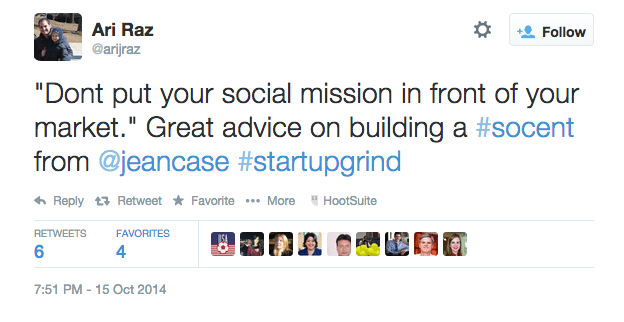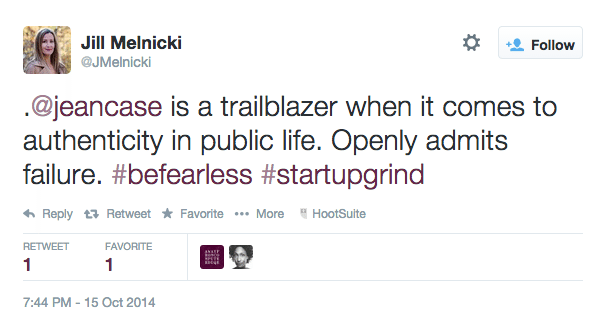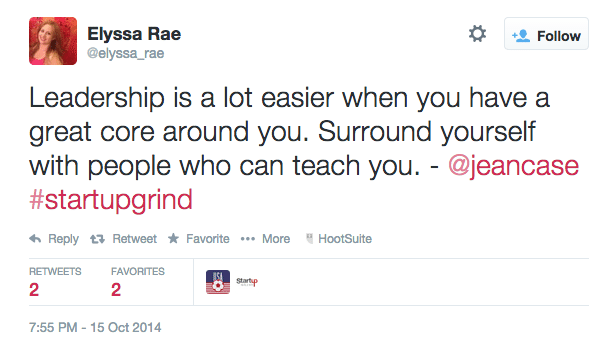At the core of the Foundation’s “Unleashing Entrepreneurship” pillar is the belief that startups—and entrepreneurial approaches—play a key role in tackling some of the world’s biggest challenges. We’ve put that belief into practice by supporting promising initiatives that bring business to the problem-solving table and catalyze strong entrepreneurial ecosystems in the U.S. and abroad.
We’ve seen first-hand the role that a business approach can play in unleashing innovative new ideas and providing scalable models for change all over the world through a number of organizations and initiatives we’ve supported, including: the U.S.-Palestinian Partnership’s investment in entrepreneurs in the West Bank; Water for People’s efforts to leverage community-based entrepreneurs to provide access to clean water and sanitation in the developing world; and Startup America Partnership and UP Global’s development of strong entrepreneurial ecosystems. We’re also focused on building the impact investing movement, which we believe will catalyze a significant wave of new capital to companies that will not just benefit their shareholders, but society as a whole. The Foundation’s most recent exploration has been in launching an Inclusive Entrepreneurship initiative that confronts rising inequality and taps into the fuller entrepreneurial potential of communities and countries (including all backgrounds and locations) to get beyond those who traditionally have easier access to entrepreneurship and lift up women- and minority-owned businesses.
It is for all of these reasons that we are excited to participate in the 2015 Global Entrepreneurship Summit (GES) taking place in Nairobi, Kenya later this week. We are thrilled to join the event as part of Secretary of Commerce Penny Pritzker’s official delegation. Our CEO, Jean Case, will moderate a panel on “Women Entrepreneurs” and will judge the GES “Women + Youth Day” seminal event—a pitch competition with financial and mentorship capital prizes. The Case Foundation is proud to contribute to both aspects of the prize pool. Steve Case, who will be participating in his capacity as a Presidential Ambassador for Global Entrepreneurship (PAGE), is moderating a panel on “Getting Ready for Growth” featuring groundbreaking entrepreneurs and investors, including fellow PAGE member Brian Chesky from Airbnb.
There is plenty of excitement over the fact that this year’s summit in Nairobi is the first GES taking place in sub-Saharan Africa. Over the past few years, we’ve continued to hear about the shift from aid dollars to investment flowing to the continent, expressed by the familiar refrain that “Africa is open for business.” That is why in addition to our time at GES, we are excited to spend time in Nairobi, as well as in Accra, Ghana and Lagos, Nigeria exploring these emerging entrepreneurial ecosystems over the next few weeks.
In each city, we will have the opportunity to visit with some of the organizations we’ve supported in Africa over the years (including Sanergy in Nairobi), spend time at accelerators like the iHub, HubAccra and Co-Creation Hub and participate in panel discussions with leading African entrepreneurs and investors. We expect to learn more about the unique aspects that make each city’s entrepreneurial scene tick—from social entrepreneurs tackling challenges like energy and sanitation in Nairobi, to the fashion-savvy hub of Accra and the e-commerce revolution in Lagos.
Most of all, we are excited about spending time with the entrepreneurs—with special attention given to women entrepreneurs and social enterprises—who are at the heart of driving innovation in each of these cities. In addition to site visits with some of the continent’s fastest growing companies like M-Kopa in Nairobi, Andela and ACE in Lagos and the Cadling Fashion Factory in Accra, we will host a pitch competition in each city. A set of the most promising young startups in each region will vie for an investment prize of at least $25,000 from Jean and Steve Case, matched by local and international investors.
We can’t wait to hear the stories of these entrepreneurs who are working on game changing solutions not just for Africa, but also for the world, and sharing those stories along the way. Be sure to follow along via Twitter @CaseFoundation and #CaseAfrica, as well as via our personal Twitter handles: @AllieB, @SHerrling and @Broksas.
![diagram_image[1]](https://casefoundation.org//wp-content/uploads/2015/01/diagram_image1-300x275.png)


